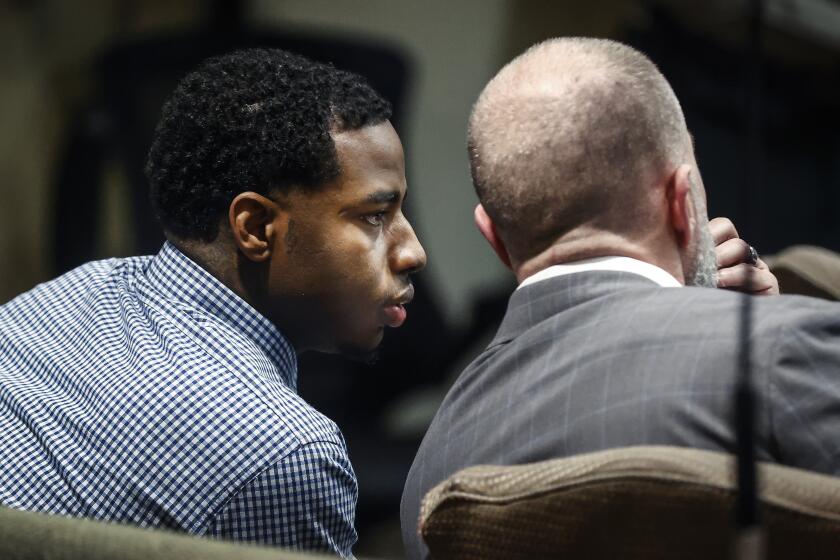Scaled-down La Scala
FORGET about actors. Los Angeles is a town full of opera singers looking for work. They’re your waiters, computer programmers, kindergarten teachers, even your letter carriers. Small companies have been springing up all over town and around the country, some even started by the singers themselves, to give them opportunities -- not to mention offering budget-minded audiences an affordable way to see opera.
“This is absolutely a trend we are observing in many citites,” said Marc Scorca, president of Opera America, a national service organization. “If not four or five as in Los Angeles, it’s one or two in cities that have a major opera company. Los Angeles is a bigger city than most, so the numbers there are bigger.”
Even if these small companies don’t offer much -- or sometimes anything -- in the way of salaries, they give singers a chance to get onstage, perform with small orchestras and, perhaps most important, add job experience to their resumes.
“It’s very hard to get established,” said Eylse Cook, a just-turned-40 soprano who has sung for Opera Pasadena and Duarte-based Intimate Opera Company, among others, and who works in a corporate legal department.
“When I graduated from college, I went through a series of auditions. Nothing happened. Nothing happened. Then almost by accident, I got asked to do a chorus part in ‘Madame Butterfly’ with the Bel Canto Opera Company, which doesn’t do anything any more.
“Then I got a bit part, understudied Mimi in their ‘La Boheme’ and slowly began to get known around town. Very seldom do I audition any more. People call and ask if I’m available to do this or that role. Most don’t pay. Intimate Opera does pay.”
Telling a similar story is Begona Bilbao, a 37-year-old Venezuela-born soprano who moved here from New York in 1996 when her husband, a doctor, got a job at UCLA.
“When I started singing in Manhattan, I auditioned for the big roles, but I didn’t get them,” Bilbao said. “I sang at Brooklyn College, where I did my master’s, and in opera workshops.”
Moving here meant starting over. “It was not easy,” she said. “You need good references and nobody knows you until you have a chance to prove yourself. I’ve auditioned for so many companies, a lot of times, and still do that.”
Only Mario Leonetti’s Casa Italiana dinner-theater opera company in downtown Los Angeles gave her a break, and even that took a while.
“At the beginning, Mario didn’t have anything for me,” said Bilbao, a former voice teacher and now stay-at-home mother of two. “I stayed in the chorus for a long, long time. It was hard. But Mario has been the only one who has given me the chance to sing. I really want to thank him. He dreams for me to be in L.A. Opera. I know the way things have been going -- I’m not singing in Europe, I don’t have a big career -- but without him, there would be no way even to have a hope.”
*
Filling a niche
CASA ITALIANA, which celebrated its 35th anniversary last month, does three productions a year, each costing $3,000 to $6,000, according to Leonetti. The singers don’t get paid, although the musicians do. Still, Bilbao is grateful.
“You don’t have too many chances to sing with an orchestra,” she said. “Everything is so competitive. But you need to sing to grow.”
Other troupes have sprung up recently to answer that need, including Valley-based El Dorado Opera, Intimate Opera Company, Lyric Opera of Los Angeles, Opera Pasadena and Los Angeles-based Repertory Opera Company.
All are low-budget operations with productions costing $5,000 to $60,000. Singers include amateurs, recent grads, community members and local professionals. Most don’t get paid. Choruses are small and notable more for zest than polish. Sets, costumes and stage directions are minimal.
Still, ticket prices are low and venues are small and less intimidating than some find the Dorothy Chandler Pavilion. In most cases you get what you pay for, but any one of these troupes might showcase a young talent on the way up and give the audience members -- who are often friends, family, other singers and local opera lovers -- the chance to say they heard them when. And the companies all serve a need.
Take Intimate Opera Company, founded in 1996 by Wendy Kikkert, a 49-year-old mezzo-soprano and a Beverly Hills Outlook music reviewer.
“When I started this, when I was in my 30s, part of it was, I get to put on productions, perform and include other singers,” she said. “But it got bigger than that. Now I see us as filling a gap. Singers in college get some experience, but young artists’ programs are disappearing. To get stage experience with an orchestra so that a regional house would consider you, it’s very hard. We help young singers build their resumes and get that experience. It is a lot of work. I do it because, for me personally, it’s a call on my life.”
Intimate Opera does three productions a year on a yearly budget of about $60,000, raised from ticket sales, donations and grants. Singers are paid $50 a performance for major roles, $25 for others.
Opera Pasadena was started in 2000 by opera soprano Ella Lee also to help young local singers gain experience. “We started with a series of programs at the Pacific Asia Museum in Pasadena, with mostly Ella herself singing,” said Barbara Ebert, the troupe’s music director. That led to the first production of Mozart’s “Cosi fan tutte” in 2000. The troupe then moved from the museum to a local church. Its current home is Wilson Middle School in Pasadena, although it continues to present smaller programs at the museum.
“Our goal is to do two main productions per season, then a smaller program of excerpts at the museum with piano,” Ebert said. The budget is around $12,000 per show. Most of the money comes from ticket sales.
Do the singers get paid?
“We wish we could,” Ebert said with a sigh.
Lyric Opera of Los Angeles and El Dorado Opera are carving out their own niches.
Lyric Opera, created in 2002 by soprano Laura Sage-Ruiz and her father, Robert Sage, a professor of music at Azusa Pacific University, revives works that never made it into the standard repertory.
“You can see ‘Magic Flute,’ ‘Don Giovanni,’ ‘Traviata’ anywhere, anytime,” Sage-Ruiz said. “It seemed a natural when I started to do these operas you couldn’t see anywhere else. Maybe some of the larger budgets will produce them on a grander scale with budgets we couldn’t hope for. They’re pieces that should be performed, not just because they’re not known.”
Those operas, performed at various venues until the company settled this season at the Palace Theatre in L.A., have included Marschner’s “Der Vampyr,” Pauline Viardot’s “Cendrillon,” Auber’s “Manon Lescaut” and, most recently, Verdi’s “Un Giorno di Regno.”
Lyric Opera’s budget, which is derived almost entirely from ticket sales, ranges from $36,000 to $60,000 per production, Sage-Ruiz said. There’s a freelance orchestra and the singers get paid. “They don’t get paid a lot. But they do get paid,” said Sage-Luiz.
*
Opera in Spanish
VALLEY-BASED El Dorado Opera was formed last year by sister-and-brother team Mavis Cordero and Alex Britton. Their marketing strategy includes reaching out to the Latino community with performances in Spanish, as well as in the original language.
“One of our goals is to be very inclusive,” Cordero said. “We’re from Colombia. We have a very big attachment to our culture. We thought, ‘How can we make ourselves unique and go after a market that perhaps has had opera in their culture, but is never exposed to it in their language?’ ”
They’ve devised what they call their “Seville Project,” a plan to present five operas whose action is set in Spain over five years. Each will have at least one performance in Spanish. The project began in October with Mozart’s “Don Giovanni.” Mozart’s “Marriage of Figaro” is on tap for 2007, followed by Bizet’s “Carmen” in 2008, Rossini’s “Barber of Seville” in 2009 and Beethoven’s “Fidelio” in 2010.
That is, if all goes well. Right now, although El Dorado may have the largest annual budget of the lot -- about $250,000 -- Cordero said “we’re still cutting corners. It’s tough. But every singer and every musician gets paid, unlike some other companies.” She declined to give salary information. The average production cost, she said is $60,000 to $70,000. “We’re starting to get some donors, and we need more money, of course.”
LizBeth Lucca’s Repertory Opera Company, founded in 2003, has big ambitions, but a very small budget, about $14,000 a show. Lacking an orchestra, her singers are accompanied only by pianist and music director Brian Farrell, a Juilliard School graduate.
Lucca tries to put a good face on the situation. “It’s more immediate,” she said. “There’s a real connection between the singers and the piano.”
Some of the singers are paid, but Lucca said their fees are confidential.
Her strategy for success is to progress slowly and carefully. “We’ve tried with each show to add one thing, to make one thing better,” she said.
Although she recently moved operations from a church in mid-Wilshire to the new Nate Holden Performing Arts Center near La Brea Boulevard, she can keep costs low because “the people in the company are supportive of the company financially. We also have some donors who are excited about having a second full-season company in the city.”
Like all the other small company directors, Lucca knows she has a tough road ahead.
“Everybody says, ‘If I had known how hard it is to start a company, I don’t know if I could have done it.’ But each time we do something, our singers get better and our reputation grows. To be in a theater after being in a church is such an emotional boost. It’s very exciting that people can know that there are other opera options in Los Angeles.”
*
*
(BEGIN TEXT OF INFOBOX)
Where to get seats for a song
Here’s what’s coming from some of the smaller opera companies that perform in and around Los Angeles:
Casa Italiana Opera Company: March 4: Mascagni’s “Cavalleria Rusticana”/Leoncavallo’s “Pagliacci.” Casa Italiana, 1051 N. Broadway, L.A. (818) 559-8696, (310) 451-6012. www.casaitaliana.org.
El Dorado Opera: Dec. 14-17: Menotti’s “Amahl and the Night Visitors.” Dec. 21-22: Handel’s “Messiah.” El Portal Theatre, 5269 Lankershim Blvd., North Hollywood. (818) 232-7414. www.eldoradoopera.org.
Intimate Opera Company: Dec. 9: Menotti’s “Amahl and the Night Visitors.” Harbeson Hall, Pasadena City College, 1570 E. Colorado Blvd., Pasadena. Also Dec. 16, Packard Hall, Westminster Gardens, 1420 Santo Domingo Ave., Duarte; Dec. 17, Aztec Hotel, 311 W. Foothill Blvd., Monrovia. (800) 888-7287. www.intimateopera.net.
Lyric Opera of Los Angeles: Dec. 8-17: Mozart’s “Bastien und Bastienne.” Palace Theatre, 630 S. Broadway, L.A. (800) 471-9515. www.LyricOperaLA.org.
Opera Pasadena: Jan. 28: Opera and Broadway duets. Pacific Asia Museum, 46 N. Los Robles Ave., Pasadena. (877) 342-6268. www.operapasadena.org.
Repertory Opera Company: Feb. 3-11: Donizetti’s “Don Pasquale.” Nate Holden Performing Arts Center,
4718 W. Washington Blvd.,
L.A. (323) 969-4602. www.repertoryoperacompany.org.
More to Read
The biggest entertainment stories
Get our big stories about Hollywood, film, television, music, arts, culture and more right in your inbox as soon as they publish.
You may occasionally receive promotional content from the Los Angeles Times.










